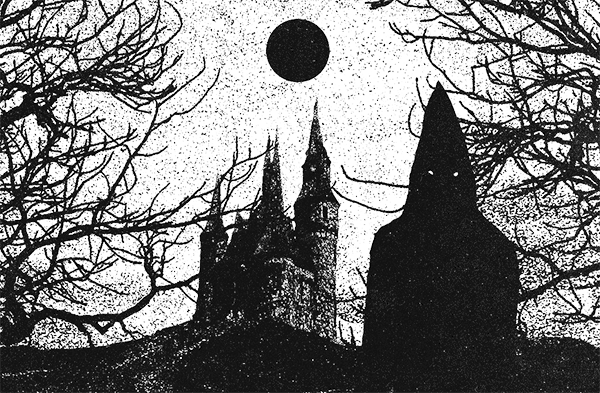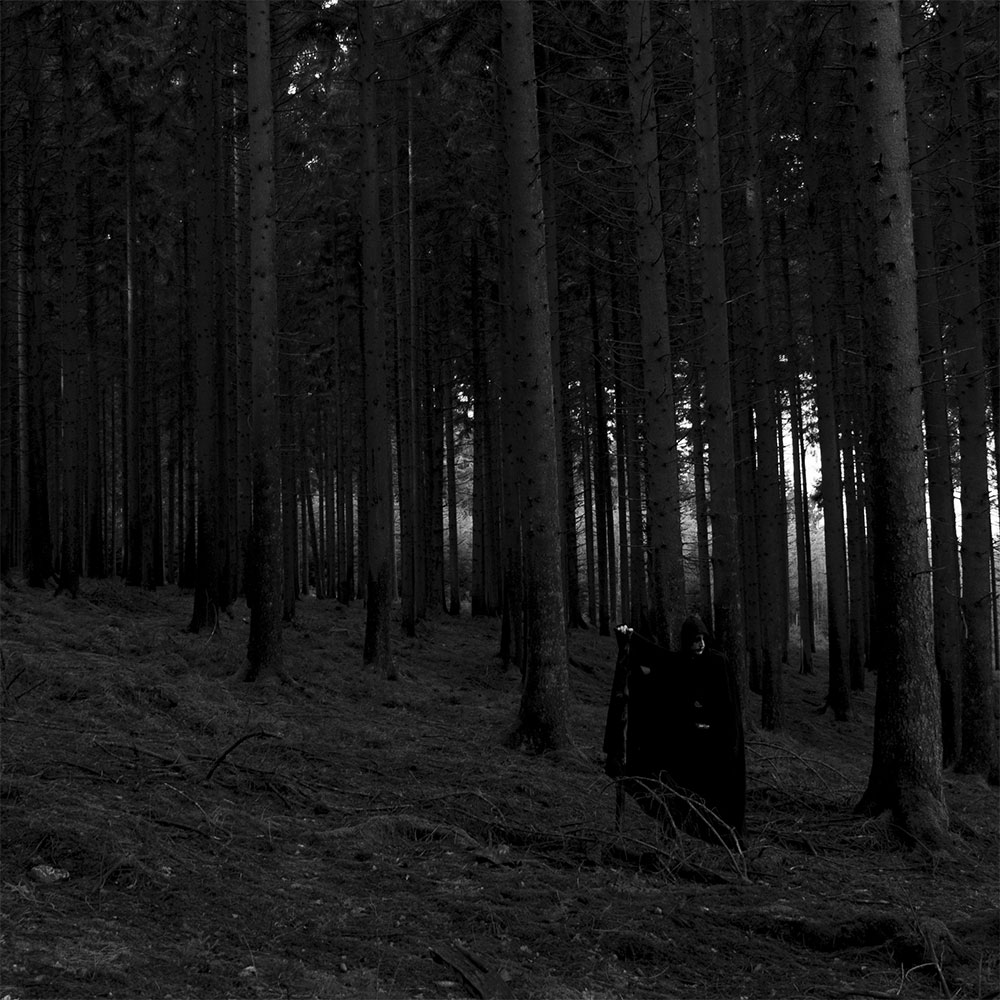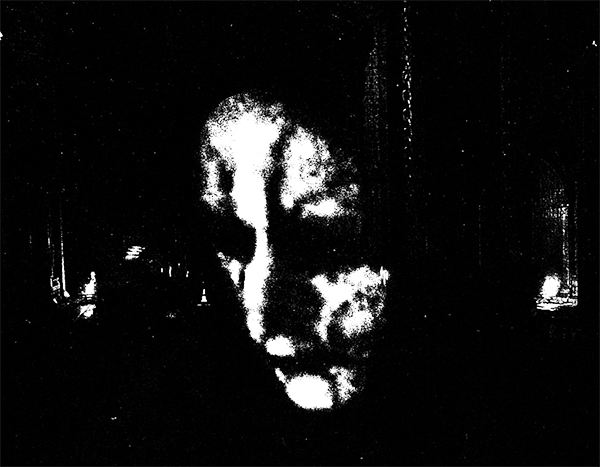Old Tower
2019-05-01
by Niklas Göransson
Old Tower presents reality-transcending ethereal darkness in musical form. The project’s architect – a man known only as The Specter – speaks of the mortal terror which serves as inspiration, and why he now shuns the dungeon synth moniker.
– I’d already been recording ambient music under various names before founding OLD TOWER in 2015, but none of it was ever really what I was looking for. However, when I received the first FORGOTTEN KINGDOMS demo tape it ignited something inside me – I felt inspired to start a synth project in similar style and did so by highly impulsive and simple means. The first demo was written and recorded all in one session, I then made the artwork; everything within a single day. There wasn’t a whole lot of conscious thought involved in this process, I was mostly running on sheer inspiration. What keeps me going these days is perfecting my craft to the best of my abilities, I try to make every recording and artwork better than the preceding ones. I don’t think I’ve said everything I want to say quite yet.
I noticed you’ve abandoned the dungeon synth moniker in recent years?
– The main reason is because I see OLD TOWER as an entity with many different faces. The first recordings were definitely in the more classic dungeon synth vein, so to speak, but I feel the project has more to offer than this particular style. I’ve been treading different musical ground with my newer material so I’d rather call it ‘dark synth music’ or something along those lines. The other reason is because I can’t really relate to the newer ‘dungeon synth’ movement of this day and age.
The Specter explains that a watershed moment for the scene was when Bandcamp in 2017 published a feature showcasing many of the genre’s leading contemporary artists.
– I believe this to have been an important event in the development of dungeon synth. Many projects in this style have been popping up over the past few years but, in my opinion, a lot of them miss the point. Where’s the ‘dungeon’ in today’s dungeon synth? I just can’t relate to many of these traditional fantasy themes which now dominate the genre, it was never about that in the first place. It’s about building a world of your own – your dominion – where you stand alone against all. This is what’s missing in the present age; that special, mythical feeling of the old days. It was mysterious and appealing. Now, and for many reasons, it just puts me off.

My knowledge about contemporary dungeon synth is rather limited – OLD TOWER was recommended to me last year when I spoke to O. T. of AKITSA – but a select few works from this genre played an important part of my adolescence. Early Mortiis was one, of course, but my single favourite composition of this kind must’ve been SATYRICON’s “I en svart kiste”; it had an incredibly dark and majestic depth for its time.
– BURZUM is still untouchable in my opinion; the way he created his world around him, in all aspects, was and still is ground-breaking. His ambient works have obviously been very influential to me; I’d even venture to say that “Rundgang…” is one of his best tracks. The simplicity and hypnotic quality never bores me and always sounds fresh – even after hearing it well over a thousand times by now.
I was recently made aware that not all such projects age with equal grace. In preparation for this conversation, I revisited another old favourite: VOND’s ”Selvmord”. Upon first hearing the album, it was some of the most grippingly sorrowful stuff I’d ever come across. However, after listening to it for the first time in two decades I was forced to conclude that the impact has lessened somewhat.
– “Selvmord” sounds like a watered-down version of the earliest Mortiis material – it’s not a bad recording but definitely not his best. My personal favourite regarding VOND is “Green Eyed Demon”, which is a totally miserable and nihilistic experience unlike anything else he’s ever done; a classic death industrial album if you ask me. I don’t think this kind of music ages poorly but it’s a fact that not many recordings out there stand the test of time. While it’s easy to get enthralled by what this music represents, hardly anyone manages to capture its essence.
One also recalls the overabundance of my-first-Casio projects emerging once the style caught on properly. GRIM’s 1995 demo “Färd” comes to mind, in somewhat traumatised fashion.
– I think some of these older demo side-projects definitely have their charm; the whole crudeness of them appeals to me. Many modern artists try to emulate this particular aspect but end up failing in the end. A lack of both authenticity and attention to detail in terms of artwork, soundscape, and song structures… even some of the worst recordings from back in the day sound closer to the genre’s essence than much of what’s produced today.
The Specter has previously stated that much of his artistic inspiration is drawn from both history and fiction, whereas he detests the modern world and its inherent boredom. Consequently, I’m wondering if OLD TOWER should be regarded as some manner of escapist medium.
– First and foremost, I make this music to please myself so what to do with it is up to the listener. If it helps people escape from this reality, even just for a little while, then my work has succeeded. To me, OLD TOWER transcends mere escapism – it’s rather a portrayal of my earthly experience and musings over the world we live in. Make of that what you will. In an age where spirituality in art is on a rapid decline, it’s important to emphasise the fact that my music is indeed laden with goals and spiritual messages.

Do you believe in any kind of supernatural influence over mortal art?
– Absolutely. There are only so many things one can explain by strictly scientific means. Spirituality and religion have always helped people reach places they normally wouldn’t dare traverse. Without it, this world would have significantly less spice, so to speak. That’s the power we have as human beings – we’re able to change our headspace which, in turn, allows for us to transcend this reality. Many people associate the ‘supernatural’ with something that manifests physically; this only goes to show the limitations of their thinking. I believe it mostly exists within the mind itself. Of course, there are events occurring in the physical realm that go beyond any reasonable comprehension but some things neither can nor should be explained. If we already knew everything there’d be nothing left to search for and this would cause stagnation.
The Specter adds that the only way to attain true greatness is looking past what we already know – experiencing it, and seeing for ourselves.
– H.P. Lovecraft went beyond the point of human reasoning and came up with concepts which have shaken my foundation to the core. Most fiction still feels distant but reading his work is like actually experiencing what the protagonist is going through; it feels impossible and realistic, both at the same time. Thus far, at least in my opinion, hardly anyone in the entire world of literature has reached the same level. His world becomes reality when you engage with it and this will always be my main inspiration.
Theatrical and immersive music without beats or a narrative like dark ambient, dungeon synth, and analogous genres are often used as part of a meditation practice. Many who engage in such activity report so-called closed-eye visuals perceived as colours, geometric shapes, or even images taking form and swirling along with its soundtrack. As such, I wish to know what the visual representation of OLD TOWER means to The Specter.
– This is precisely what I want to hear from listeners, that they use my work as a tool to drift away in their own mind and imagination. Aesthetics are as important to me as the music itself, which is why I also invest a lot of effort in creating all art for OLD TOWER myself. When listening to music I tend to have the album artwork in my head; therefore, I think people will automatically associate my music with the visuals I present. If someone dreams or sees other things while listening to my stuff, that’s great – I received some comments here and there from listeners stating they were transported to fantastic and otherworldly realms, which is a great compliment.

I read in a previous interview that The Specter gave up psychedelics following one too many adverse experiences. I’m curious if this dreamlike darkness his music taps into is in any way a remnant from these ordeals.
– All my trips were inspiring enough later on – they taught me to see things differently – it just took a long time to harvest their fruits since the negative effects still lingered for years afterwards. I guess that in itself was inspiring as well, to see clearly what your own nature is capable of and how you are your own worst enemy. Still, the need to explore different areas of the mind, especially the darker sides, remains to this day; I guess that’s where my art comes into play. It’s a means of exploring those regions safely, without having to literally risk losing either my mind or my self.
Any particularly memorable sojourns?
– It’s hard to put into words what one would experience during such a trip because it usually doesn’t make any sense to yourself either. The best way I can describe it is that your humanity tries forcing you back into ‘reality’, which is why one’s perception of the surrounding world gets distorted – in a negative sense. It usually means you didn’t take a high-enough dose, since your ego is still able to put up resistance. I suppose that’s what I failed to do towards the end of my psychedelic ‘career’, hence the multiple confrontations with myself. However, I must say it was the bad trips which made me think the most, they really changed my perspective on life in general. The positive ones were incredible and something I’ll never forget but I didn’t get as much out of them. It was good while it lasted but I have no interest in returning to that space again. In hindsight, it wasn’t such a clever idea to trip so often during a period of mental instability; I was in a pretty bad state at the time and didn’t particularly care what happened to me… big mistake. The last trips were pure hell, enough for me to say, ’That’s it, I’ve seen enough.’ I’m not sure where I’d be now if I’d continued doing these drugs at the pace I was back then. I sincerely doubt I’d be doing an interview at the moment, hah.
One ailment of the mind The Specter grappled with, both during and outside of psychotropic contexts, is an intriguing condition discussed in Bardo Methodology several times before: derealisation. Medically termed as a temporary psychosis, it’s been known to make its appearance in conjunction with fits of mental instability, deep meditation, or high dosages of ego-dissolving psychedelics. It instils upon you the stanch and unwavering conviction that our mortal reality, all that we can touch and see, is naught but a grand illusion; nothing and no one is real. Meaning, precisely what most major non-Semitic religious traditions purport. Suffice it to say, the most common reaction for the Western mind is that of an existential angst on a literally cosmic scale.
– I suffered from long-term derealisation episodes some years ago, they still happen sometimes but, fortunately, don’t last very long. When these experiences first occurred, I felt absolute dread. People I knew and talked to in real-life suddenly seemed alien, the world around me fake and flat. The feeling also seemed to never end, obviously making it all the more terrifying. After many years the effects started wearing down and I can now recognise and pinpoint when I’m falling back into that mind-state. It usually happens when I’m under a lot of stress or suffering general mental fatigue.
Has this either solidified or changed your views on ’reality’ and its purported illusory nature?
– These derealisation episodes showed me that reality as you’d ‘normally’ experience it is very fragile. There are many possibilities to break down the walls of that existence. Is that something illusory? I don’t think so. A different perception doesn’t mean it’s not real.



